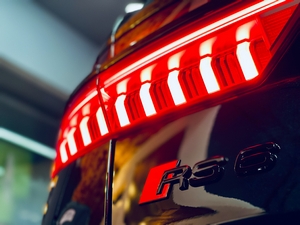
















|
|---|
|
Tail Lights: The Future of History Publisher: The Crittenden Automotive Library Byline: Bill Crittenden Date: 1 February 2023 |

 Audi RS 6 photo by Agent J. Audi RS 6 photo by Agent J. |
Without getting too far into a history of the internet, there have been a few major changes in how information is found from the user's perspective. In the earliest years, you went to Yahoo! or AOL or typed in whatever-you-were-looking-for dot com, and followed static hypertext links from page to page, back when this was called "surfing the internet."
AOL had a proprietary keyword service only accessible to subscribers, so more people are familiar with Yahoo!, founded in 1994. I still have my personal @yahoo.com email address, and I found my wife on the now-defunct Yahoo! Personals. Anyway, the main page had a list of topics the kind of formed an outline of the internet. Click on one, and you'd find a list of links with short descriptions or subtopics to further refine your search. It was human-edited, so it was very labor intensive and sometimes subjective. It also required people to come along and remove broken links manually, too.
Then Google came along in 1998, and the automated search engine made it possible to find the most obscure information in seconds. It could find the needle in the haystack, but it couldn't tell two needles apart from each other and it wasn't very good for browsing the whole haystack. This prompted a lot of websites to put a ton of information online accompanies by advertising in the margins (kind of like this site...) and that encouraged a massive data dump that has seen so much of humanity's knowledge put where it can be publicly found.
We're late in this massive data dump and it's getting to the point where the volume of data is making search less useful. At best the search engine makes mistakes, or ranks the same sites and content at the top of different searches just because it's popular when it's only popular because of Google. Without human intervention, this has reinforced misinformation. At worst, keyword manipulation and clickbait makes useless "content" rank higher and valuable internet content escapes indexing like fuzzy text in newspaper scans or words spoken in audio & video.
Now that we have this huge pile of data, it's time to reintroduce human intervention and sort it.
Wikipedia came along in 2001 and showed us how volunteers can come together and create something organized, cited, and with pages nicely tied together. But it's an encyclopedia, not a library, it's not meant to include everything you might want to know on a topic. The citations aren't a link list so much as they're a proof of source material.
The Crittenden Automotive Library doesn't have every feature and function I'd hoped, and it doesn't have nearly as much content as I could have if I had more time, but it's my idea of where the future of information on the internet is going.
One field of study is set apart and organized by a person with some experience in the field. It's human edited and sorted for topics and subjects, which are static (except for adding new content) so that they're browsable. I'm transcribing that fuzzy newsprint into indexable computer text, and if I had the time I could do the same to old public domain films. Search is still a great tool for picking through all that text for phrases or references that don't rise to the level of placing an article on a topic page, it just should not the be-all-end-all of the internet.
If the content is licensed or public domain, it appears directly on the site preventing the work involved in maintaining thousands of links to other sites that might change their addressing structure, phase out old material, or just go offline. I don't have the time to maintain what I have now as external links let alone create copious lists of external links for all the articles and reports I can't post directly on CarsAndRacingStuff.com, and I don't have the legal department that would let me get away with showing other sites' images directly on CarsAndRacingStuff.com the way Google Images does.
Maybe someday Google will adopt human edited lists or Wikipedia will expand to include an outline of the internet similar to the old Yahoo! index. But that's fraught with the possibility political grandstanders targeting them the way Google has already had to answer to conspiracy theorists in Congress, or Wikipedia constantly fighting vandalism from political operatives, or the whole "Twitter files" mess.
There's an advantage to being a smaller site with a narrow-ish target audience, and it's basically being out of the spotlight and focusing on what I know best. The disadvantage is that I don't have the money to hire the small army of people it would require to do all the things I'd like to do. Maybe a resource-sharing network is in the future, where similar sites share knowledge on sources and practices while maintaining our own separate fields based on our own experience.
In the meantime I'll just keep doing what I can with the topic I love.
629.2
The Dewey Decimal System's designation for automobiles falls within the 629.2 range. This section is about Library Owner Bill Crittenden's personal collection of books, magazines, and miscellaneous papers, much of which is available for reference if it's not directly available on CarsAndRacingStuff.com.
Book #855 in the Offline Physical Collection is the first one about gas stations, and it has a heck of a title. "Pump and Circumstance: The Glory Days of the Gas Station" by John Margolies is from 1993.
History Beyond the Bumpers
The Crittenden Automotive Library includes information from all aspects of automotive transportation and competition. This section highlights interesting topics related to automobiles other than vehicles themselves.
As the internet rose, print media has declined. Unfortunately, material not saved in The Internet Archive's Wayback Machine has been most likely completely lost. A lot of print media still survives in libraries, archives, and collections. It can be found and sold and traded at book sales, flea markets, and at auction. But digital media is different. Even if you have an obscure copy of an article or photo on your hard drive, posting it online is legally considered republishing it and forbidden due to copyright. So there are no eBay auctions, no Friends of the Library sales, no flea market finds. Some of it gets copied and traded behind the scenes, but that's usually within small groups and on media that eventually deteriorates.
Much like the a gap between film and digital recordings where tape recorded video is of very low quality if not lost completely, there's going to be a historical gap between the decline of print and better methods of archiving & sharing digital media. This won't be exclusive to automotive media, but we'll experience it.
Mile Markers
Offline Physical Collection: This month's biggest percentage increase comes from Collector Cards with a 54.79% increase in the collection. This comes from some boxes of cards from the "junk era" of collecting which were rubber banded and stuck together. They're not worth anything, but just imagine how little of the past we'd have now if we only saved what was in mint condition. So they get peeled, indexed, and re-boxed in the humidity-controlled storage of The Crittenden Automotive Library. Including my previous collection, the first 10,400 cards are listed and in the boxes.
Online Collection: With a lot of offline work and indexing going on, not much made it online in January. The 0.17% increase in Images (61 total to 36,309 total) will have to do.
About The Crittenden Automotive Library
The Crittenden Automotive Library @ CarsAndRacingStuff.com, based in Woodstock, Illinois, is an online collection of information relating to not only cars, trucks, and motorcycles, but also the roads they drive on, the races they compete in, cultural works based on them, government regulation of them, and the people who design, build, and drive them. We are dedicated to the preservation and free distribution of information relating to all types of cars and road-going vehicles for those seeking the greater understanding of these very important elements of modern society, how automobiles have affected how people live around the world, or for the general study of automotive history and anthropology. In addition to the historical knowledge, we preserve current events for future generations.
The Library currently consists of over 868,000 pages of books, periodicals, and documents, over 54,000 individual articles, more than 18 days of video & 24 days of audio, more than 36,100 photographs & other images, and offline reference materials including 855 book volumes, over 1,200 magazines, and thousands of advertising brochures & documents.
